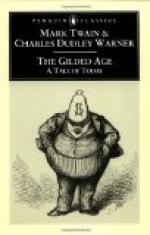“Lord bless you—I’m glad to see you, Washington—perfectly delighted to see you, my boy! I got your message. Been on the look-out for you. Heard the stage horn, but had a party I couldn’t shake off—man that’s got an enormous thing on hand—wants me to put some capital into it—and I tell you, my boy, I could do worse, I could do a deal worse. No, now, let that luggage alone; I’ll fix that. Here, Jerry, got anything to do? All right-shoulder this plunder and follow me. Come along, Washington. Lord I’m glad to see you! Wife and the children are just perishing to look at you. Bless you, they won’t know you, you’ve grown so. Folks all well, I suppose? That’s good—glad to hear that. We’re always going to run down and see them, but I’m into so many operations, and they’re not things a man feels like trusting to other people, and so somehow we keep putting it off. Fortunes in them! Good gracious, it’s the country to pile up wealth in! Here we are—here’s where the Sellers dynasty hangs out. Hump it on the door-step, Jerry—the blackest niggro in the State, Washington, but got a good heart—mighty likely boy, is Jerry. And now I suppose you’ve got to have ten cents, Jerry. That’s all right—when a man works for me—when a man—in the other pocket, I reckon—when a man —why, where the mischief as that portmonnaie!—when a—well now that’s odd—Oh, now I remember, must have left it at the bank; and b’George I’ve left my check-book, too—Polly says I ought to have a nurse—well, no matter. Let me have a dime, Washington, if you’ve got—ah, thanks. Now clear out, Jerry, your complexion has brought on the twilight half an hour ahead of time. Pretty fair joke—pretty fair. Here he is, Polly! Washington’s come, children! come now, don’t eat him up—finish him in the house. Welcome, my boy, to a mansion that is proud to shelter the son of the best man that walks on the ground. Si Hawkins has been a good friend to me, and I believe I can say that whenever I’ve had a chance to put him into a good thing I’ve done it, and done it pretty cheerfully, too. I put him into that sugar speculation—what a grand thing that was, if we hadn’t held on too long!”
True enough; but holding on too long had utterly ruined both of them; and the saddest part of it was, that they never had had so much money to lose before, for Sellers’s sale of their mule crop that year in New Orleans had been a great financial success. If he had kept out of sugar and gone back home content to stick to mules it would have been a happy wisdom. As it was, he managed to kill two birds with one stone—that is to say, he killed the sugar speculation by holding for high rates till he had to sell at the bottom figure, and that calamity killed the mule that laid the golden egg—which is but a figurative expression and will be so understood. Sellers had returned home cheerful but empty-handed, and the mule business lapsed into other hands. The sale of the Hawkins property by the Sheriff had followed, and the Hawkins hearts been torn to see Uncle Dan’l and his wife pass from the auction-block into the hands of a negro trader and depart for the remote South to be seen no more by the family. It had seemed like seeing their own flesh and blood sold into banishment.




